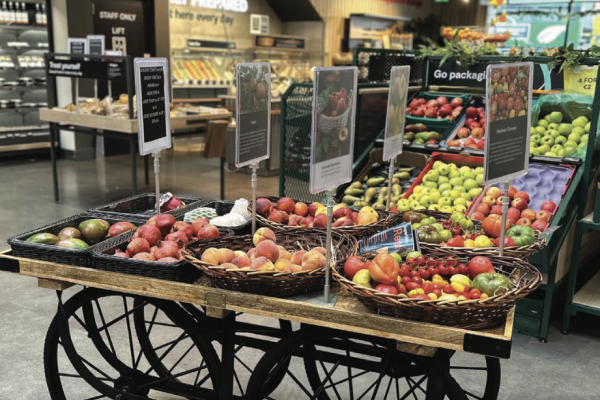As a shopper, mum of two, retail expert and co-author of the Sustainable Irish Retail Action (SIRA) Guide, retail sustainability is a subject about which SHARON YOURELL LAWLOR is passionate. She shares some of what she regards as the key trends for which retailers and brands should keep an eye out next year.
‘You can’t expect people to buy good if good isn’t on the shelf.’ When I first heard these words, they struck deeply, and, as a strategist, I feel a responsibility to help others evolve their retail propositions in a more sustainable way.
Much has changed in retail in recent years. Retail and its shoppers came out of the pandemic more digitalised, and, with the war in Ukraine and the subsequent energy crisis, retailers took notice of their utility bills and looked for ways to reduce them. More discussion is intensifying around our carbon footprint, and people are making more ‘conscious’ choices. Shoppers are adapting their habits, and many retailers genuinely see the benefit of having a sustainable approach to do better by their customers, staff, community and planet.
Successful sustainable retailing requires three key components: having a circular, sustainable mindset; facilitating education and empowerment around sustainable solutions; and taking action to drive change. So, what are the actions leading to the key trends for 2024, and how are grocery retailers, globally and locally, bringing these to life within their stores? Some of the most proactive retailers are keeping it simple, strengthening sustainable elements of their business, and rolling out initiatives that support small but steady changes for good.
1. Circular Retail Mindset
The aim of a circular-economy mindset is to design out waste. Instead of having a linear mindset of take, make, and throw away, it’s about looking for ways to reduce, reuse, and, when that’s not an option, recycle. This requires retail businesses to look at themselves – their physical environments, the products that they sell, the services that they provide, the processes that they use to engage with the day-to-day running of a store – and think about how they can design out waste with their suppliers and support shoppers to get on board in this process. To some, this may seem counterproductive. Isn’t the aim in retail simply to sell more? Well, no! Innovators within the retail community take a more conscious approach and actively bring shoppers along with them, every step of the way.
This means putting reduced-/no-packaging options on the shelves, signposting the sustainable options for customers, and highlighting what’s ‘in season’ (the Bord Bia website offers some great guidance on this) and ‘locally produced’, so that shoppers are more informed and can easily find such items in store.
It also means supporting shoppers to make purchasing choices that reduce food waste through solutions such as smaller pack sizes and encouraging shoppers to consciously buy what they need and will use within their homes. Finally, retailers can give shoppers meal inspiration ideas on how to use leftovers to minimise food waste and support shoppers to correctly dispose of product packaging and recycle, where possible.
Many retailers now offer better loose-product choice in categories such as fruit and vegetables, giving shoppers the option to buy, for example, loose lemons, carrots, garlic and peppers. They are also making the loose and packaging-free options more affordable and putting more effort into the display and merchandising of sustainable options. A concerted effort has been made to create display and theatre for packaging-free options and to highlight what’s local and Irish, often referred to in global markets as ‘from farm to market’.
2. Supporting The Right Choices
The most basic sustainable effort that retailers can make is to ensure that their shoppers are buying the right products for their actual needs. Why? Bad and unnecessary grocery choices often end up in the bin, so getting shoppers to make more considered choices and use what they buy, particularly from a food perspective, is a simple, sustainable measure that helps avoid waste. Retailers who ‘support the right choices’ put a strong emphasis on matching their retail solutions with the needs of their shoppers.
Many are taking the premise of ‘try before you buy,’ offering more product sampling in store, to allow shoppers to make informed choices about a product before purchasing it.
Proactive retailers also utilise social-media platforms to educate shoppers on ways to store and cook certain foods, providing easy-to-follow recipes and inspirational menu ideas on how to cook meals on a budget, use up leftovers, and try out vegan recipes. The trick is to keep it simple. SuperValu’s collaboration with chef Adrian Martin, as part of its ‘Local Action, Global Impact’ campaign, is an excellent example of this.
Read More: Musgrave Group CEO Noel Keeley Shares His Long-Term Sustainability Goals
3. Waste Not, Want Not
Food waste has always been an issue, but one of the innovative ways in which retailers are reducing food waste and turning that waste into revenue is by partnering with app services such as Too Good To Go, which connects customers to restaurants and stores that have surplus unsold food.
This service, which was founded in Denmark in 2015, covers major European cities, and in October 2020, it started operations in North America. Speaking with many retailers who have signed up in Ireland, there is a consensus that this type of service delivers a triple win and is set to expand greatly in the future.
The ‘Surprise Bags or Boxes’ not only give shoppers an opportunity to ‘bag’ a bargain of short-dated items for a fraction of their original cost, but also reduce ‘waste’ for the retailer, turning that waste into cash and encouraging footfall. Retailers also note that when shoppers pick up their ‘surprise boxes’, they often use the trip to purchase other items.
So, it’s a win for the shopper, retailer, and the planet.
4. Wonky But Wonderful
Retailers are now also adopting the same mindset and using creative ways to reduce/avoid waste around ‘wonky’ products. These products, whether they are fresh food or otherwise, may have been slightly damaged or are imperfect, but they are still fit for purpose.
By creating ‘wonky boxes’, both suppliers and retailers are utilising products that could otherwise have ended up in landfill, offering shoppers the opportunity to choose ‘wonky’ and avail of shopper discounts in the process. While I first came across this concept using local farmers’ fruit and vegetables, I’ve since seen it expand into categories such as confectionery. Expect to see more ‘wonky boxes/offers’ appearing on shelves in 2024.
5. Modular Store Environments
The same principle of circular thinking can be applied to the store environment, and innovative retailers are looking for ways to design out waste within the physical store footprint. This means rethinking how retail spaces can be designed for more modular use and re-examining communication methods with shoppers, particularly given the continuous changes required in store communications, as promotional cycles change and waste ensues. Digital signage is a clear option, as it already eliminates the regular use of paper, ink, paint and chemicals for physical signs. LED signage displays consume up to 50% to 70% less electricity than their traditional digital counterparts. Expect to see a deeper proliferation of LED digital signage within retail in 2024.
Read More: SuperValu Invests €7.9m In Sustainability Initiatives In Six Months
6. Giving Shoppers Transparency
On a recent trip to Whole Foods in Kensington, London, one thing that struck me along the food aisles was the focused effort on delivering more transparency to shoppers using QR codes. This has become an effective way of giving shoppers more information about the products that they buy – how ethically they are being sourced, ingredients, contents, and even ways in which to use the products. The same level of transparency can be seen within innovative foodservice businesses, such as Sweetgreen in the US, whereby its website provides customers with the carbon footprint of the different meal options on its menu. As customers become more familiar with such information, they will expect to see the carbon footprint of a purchase alongside the calorie count and protein and fat content.
7. Sustainable Community Retailing
One of the key trends of which you can expect to see more in 2024 is sustainable community-based retailing, which involves stores coming together more cohesively to plan out group initiatives and encourage more conscious shopping behaviours.
In July 2023, Killarney became the first town in Ireland to ban single-use coffee cups, in a move aimed at eliminating over one million single-use containers from local waste disposal systems. The initial results were hugely positive. This type of success only happens when retailers come together to plan a cohesive approach. Globally, this community-based retailing is becoming more common, so expect to see more proactive community-led initiatives, such as the one rolled out in Killarney, appearing in 2024.
8. Sustainable Staff Efforts
You can also expect to see more emphasis on staff training to support sustainable shopper behavioural change in 2024. With the focus on the roll-out of the Deposit Return Scheme (DRS), which goes live on 1 February 2024, and a spotlight on single-use coffee cups and their environmental impact, it is in the interests of retailers to use the backdrop of the DRS to train staff to support sustainable shopper behaviours within the store, such as the use of keep cups, returning ‘empties’, etc.
Retail outlets that encourage and embrace practices such as this are often widely supported by ‘conscious’ shoppers. If you want to attract that type of coffee customer, who navigates towards the outlets that make sustainable practices easier, then ensure that your store clearly communicates the shopper discount for keep cup usage, ideally in multiple touchpoints, and also that your staff members are trained to execute the transaction, aka use the discount button. The more that shoppers are positively prompted and encouraged around such practices, the more likely they are to repeat them.
9. People-Focused Retailing
Sustainable retailing offers a more ‘inclusive, people-focused’ approach. Savvy retailers know that being in a wheelchair, having sight impairment or sensory challenges, or even trying to navigate a pushchair with children can be a huge barrier to entering the retail environment for some shoppers and discourages them from frequenting certain stores. Expect to see more ‘inclusive’ efforts by retailers in 2024, with initiatives such as dedicated autism-friendly trading hours, focused community efforts to support elderly shoppers, and even having a dedicated section outside stores for ‘dog parking’.
Many of these efforts, while simple in nature, can have a hugely supportive impact on encouraging people to visit the stores. My parting note on sustainability trends for 2024 is that we can expect to see real technological advancements next year that support the retailer in his/her/their quest to be more sustainable. AI, used to support better decision-making around the needs of shoppers, will help reduce the waste with which retailers are faced, while the increased use of digital supports, such as displays, AR, QR codes, and even digital twinning (a virtual representation of an object or system that spans its life cycle, is updated from real-time data, and uses simulation, machine learning and reasoning to help decision-making) will improve the decision-making of both shoppers and retailers alike.
However, keeping it simple for shoppers is key, so there must be a clear focus on storytelling, to aid shopper understanding, staff interest, and community engagement.
Read More: How Important Is Sustainability To Shoppers?






